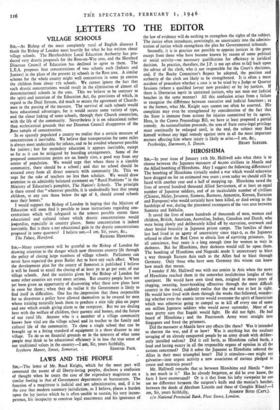HIROSHIMA
SIR,—In your issue of January IIth Mr. Halliwell asks what there is to choose between the Japanese massacre of 6o,000 civilians in Manila and the Allied bombing of Hiroshima. May I suggest the following differences? The bombing of Hiroshima virtually ended a war which would otherwise have dragged on for an estimated two years ; even today we should still be faced with another year and a half of mopping up. Hiroshima saved the lives of several hundred thousand Allied Servicemen, of at least an equal number of Japanese soldiers, and of an incalculable number of civilians (Chinese, Malay, Javanese, Siamese, Burmese, Annamite, Korean, Eurasian and European) who would certainly have been killed, or died owing to the hardships of war, during the piecemeal reconquest of the vast area between Sumatra and Sakhalin.
It saved the lives of more hundreds of thousands of men, women and children, British, American, Australian, Indian, Canadian and Dutch, who were being slowly and deliberately killed off by starvation, overwork and sheer bestial brutality in Japanese prison camps. The families of these last had lived in an agony of uncertainty since 1941-2, as the Japanese refused to allow the Red Cross to obtain lists of surviving prisoners. In all conscience, four years is a long enough time for women to wait in darkness. But for Hiroshima, their darkness would still be upon them. The bombing of Hiroshima and Nagasaki made it unnecessary to blast a way through Eastern Asia such as the Allies had to blast through Germany. Only those who have seen Germany this winter can know how much that means.
I wonder if Mr. Halliwell was with our armies in Asia when the news of Hiroshima reached them in the somewhat insalubrious jungles of that continent. He would have seen tired men, resigned to more years of slogging, sweating, heart-breaking offensives through the most difficult country in the world, suddenly realise that the end was at last in sight. He would have lived with them through the weeks that followed, wonder- ing whether even the atomic terror would overcome the spirit of fanaticism which was otherwise going to compel us to kill off every one of some ten million Japanese soldiers who would never surrender. Most of us were pretty sure that Itagaki would fight. He did not fight. He had heard of Hiroshima ; and the Fourteenth Army went straight into Singapore and freed the prisoners.
Did the massacre at Manila have any effects like these? Was it intended to shorten the war, and if so how? Was it anything but the exultant savaging of an already conquered people by an army drunk with deliber- ately installed sadism? Did it call forth, as Hiroshima called forth, a loud and lasting outcry in all the responsible organs of opinion in all the nations concerned? Did it sober the Japanese as Hiroshima sobered the Allies in their most triumphal hour? Did it stimulate—one might say galvanise—into urgent activity a new association of nations pledged to create and maintain peace?
Mr. Halliwell remarks that as between Hiroshima and Manila " there is not much in it." Has he already forgotten, or did he ever know, the facts I have enumerated? Or is it that from his lofty viewpoint he can see no difference between the surgeon's knife and the maniac's hatchet, between the deeds of Abraham Lincoln and those of Genghis Khan?.—I


























 Previous page
Previous page